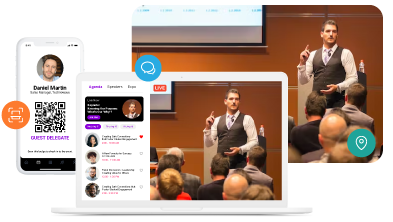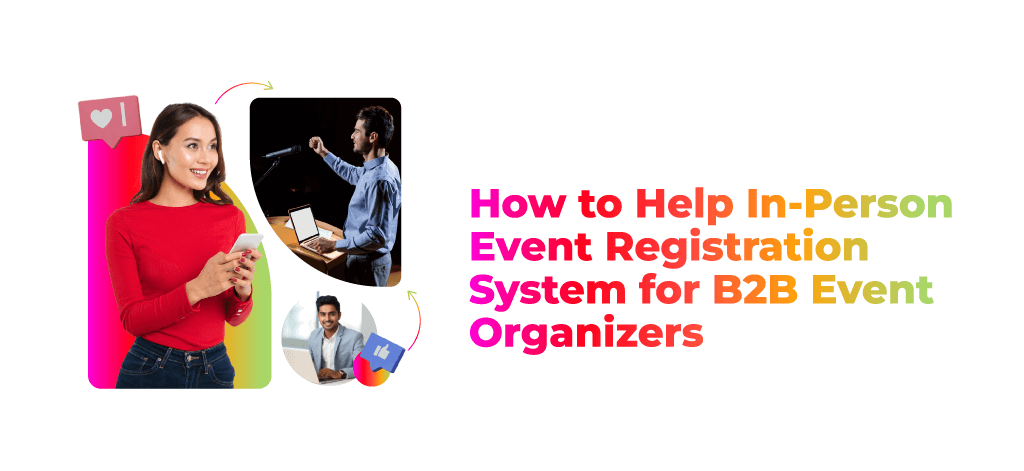The planning and execution of events is not an easy task and for B2B event formats have become more crucial. As observed, every event planning starts many days before the actual in-person event happens. But what are the core aspects to know? Well, registration and ticketing are key things. From the point the event promotions and marketing get started, the event ticketing system should also be at work. Not just that it is proven that optimizing in-person event registration and strategic deployment aims to deliver seamless and memorable experience. Here in this blog, we are going to explore the wide range of in-person event registration aspects including the latest innovations, trends, and best practices for B2B event hosts. Also, will understand everything right from the planning, and execution to the post-event with categories. So, let’s get started;
Table of Contents
The Significance of Efficient Event Registration
It is significant to have a proper in-person event registration system. Otherwise, how will people register themselves to attend any B2B event? Moreover, how will the host prepare the event arrangement? Event registration isn’t just about collecting attendee information or sending them confirmation about their slot. It is more about giving a welcoming gesture. The first point of contact for your event is the registration page, and therefore, impression building starts from there. So, it is significant to have a streamlined registration process, as it will surely enhance attendee satisfaction.
Key Components of Effective Event Registration Systems
Every B2B host always needs to explore diversified technologies and tools that can ease their manual tasks while automating others. Here are the top considerable technologies, tools, and solutions that the B2B event organizers should consider;
Event Ticketing System
Seamless Ticket Sales: Without a doubt, a smooth ticketing system, which is responsive, user-friendly, and carefully designed, can effortlessly sell tickets compared to a cluttered one. An event ticketing system can be integrated into the mobile event app or microsite. Later, the links can be spread across social media or multiple other channels to redirect attendees to promotional posts to buy tickets or register themselves.
Pricing Management: The single ticket option is an old way and no longer significant. So, what’s next? Simply offers multi-tier ticketing options. Also, as a host keep control of your dedicated event registration or ticketing system to set different pricing tiers, discounts, and promotional offers to attract a wider audience and maximize revenue generation. The flexibility to adjust the pricing based on varied factors like; early bird discounts, VIP packages, group rates, and more is helpful.
Event Check-in Solutions
Automated Check-in Processes: For the event check-in set up a desk where event badges can be collected (if there is an event badge that needs to be deployed). Besides that give the attendees an automated check-in solution with Turnstile where attendees just have to showcase their M-badge (received over mail or WhatsApp after registration completion). Moreover, the RFID, or NFC-integrated physical badge can also do the same functioning while giving you more detailed analytics.
Reduced Wait Times: By simplifying the whole check-in process, wait times can be reduced as well as the congestion at entry points. This in the bigger picture enriches the overall attendee experience. Attendees can enter the event premises smoothly and efficiently, without having to queue for extended periods, leading to higher satisfaction levels and positive event impressions.
Enhanced Efficiency: The reduction of wait times and fast event check-in solutions improves overall efficiency. Besides that the digital ticketing and elimination of paper-based systems allow the host to distribute the saved staff in doing other tasks.
Mobile-Friendly Platforms
Accessibility: Easy accessibility in an in-person event registration system indicates the mobile-responsive platform that can be accessible by attendees on any of their devices. This maximized flexibility will cater to the preferences of modern attendees who prefer the convenience of mobile devices for browsing and purchasing tickets on the go.
Convenience: Mobile event apps or microsites with user-friendly interfaces give an easy convenience to navigate through event information. The more they get to know about your event theme, itinerary, speakers, and guests, finalizing the event ticket purchase will be more.
Enhanced Engagement: One of the best things about the mobile app for events is that it keeps the audience engaged, before, during, and after the event. This can be done through push notifications, mobile alerts, and personalized communication by the host. In terms of creating an immersive experience, this is a good approach as the attendees can receive significant event updates, reminders, and exclusive offers directly on their mobile devices. This increases engagement and encourages participation.
Integration Capabilities
Choose a registration system that seamlessly integrates with other event management tools such as CRM systems, marketing automation platforms, and attendee engagement apps. This integration streamlines data management, enhances communication, and provides a comprehensive view of attendee interactions.
Personalization Options
Look for registration systems that offer customization features, allowing you to tailor the registration process to the unique needs and preferences of your attendees. Personalization options may include branded registration pages, custom fields for gathering specific information, and personalized confirmation emails.
Security Measures
Prioritize data security and privacy by selecting an in-person event registration system with advanced security measures in place. Like always make sure that the chosen platform complies with industry regulations such as GDPR and PCI DSS, employs encryption protocols for data transmission, and offers secure payment processing options to protect attendee information.
Reporting and Analytics
Opt for an in-person event registration system that offers comprehensive reporting and analytics capabilities, allowing you to track registration metrics, monitor ticket sales in real-time, and gain insights into attendee demographics and behavior. These insights enable data-driven decision-making, event optimization, and ROI analysis.
How to Prepare for a Successful In-Person Registration Process
Various things run parallel while planning any event registration process. The first objective of any host is to set up a simplified platform that eases the whole journey. So, for that, there are a few preparations which need to be done. Here is a small roadmap to follow;
Define Clear Objectives
Setting clear objectives for your event registration process is crucial for ensuring its success. In addition to defining attendee targets and revenue goals, consider outlining specific data collection objectives to gather valuable insights into attendee demographics, preferences, and interests. By establishing measurable goals upfront, you can track progress, evaluate performance, and adjust strategies as needed to achieve desired outcomes.
Choose the Right Software
When selecting event registration software, it’s essential to prioritize features and functionalities that align with your event’s unique requirements. Look for a platform that offers scalability to accommodate varying event sizes and growth opportunities. Consider customization options that allow you to tailor the registration experience to your brand and event theme, enhancing brand consistency and attendee engagement. Integration capabilities with other event management tools, such as CRM systems and marketing automation platforms, can streamline workflows and enhance data synchronization, improving overall efficiency and effectiveness.
Customize Registration Forms
Customizing registration forms enables you to collect relevant attendee information efficiently while ensuring a user-friendly experience. Consider incorporating fields for essential details such as name, contact information, and job title, as well as optional sections for additional preferences or dietary restrictions. Utilize dropdown menus, radio buttons, and checkboxes to simplify data entry and minimize errors. Additionally, leverage conditional logic to dynamically display or hide form fields based on attendee responses, creating a personalized registration journey tailored to individual needs and preferences. By optimizing registration forms for clarity and simplicity, you can enhance the overall attendee experience and increase registration completion rates.
Implement Data Security Measures
Ensure that the event registration software complies with data protection regulations and incorporates robust security features to safeguard sensitive attendee information. This includes encryption protocols, secure payment gateways, and measures to prevent unauthorized access or data breaches.
Offer Flexible Ticketing Options
Provide attendees with a variety of ticketing options to accommodate their preferences and budget constraints. This may include offering single-day passes, full event packages, VIP upgrades, group discounts, and early bird incentives to incentivize early registration and maximize ticket sales.
Streamline On-site Registration Processes
Optimize on-site registration procedures to minimize wait times and streamline attendee check-in. Utilize self-service kiosks, mobile event check-in solutions, and expedited registration lanes to enhance efficiency and create a seamless experience for attendees arriving at the event venue.
Utilize Data Analytics for Insights
Leverage data analytics tools and reporting features within the event registration software to gain valuable insights into attendee behavior, registration trends, and demographic profiles. Analyze registration data to identify patterns, track performance against objectives, and inform strategic decision-making for future events.
Best Practices for Setting Up Robust Event Registration System for B2B Event Organizers
The event starts from planning to post events and strategic plans to practices should be something as a host you must be aware of. Here are some of the core elements to keep accounted for while planning to execute the event registration system for the event itself
Building Anticipation: Pre-Event Promotion and Communication
Multichannel Promotion: Take advantage of email marketing, social media campaigns, and website announcements so that you can generate excitement and drive registration.
Clear Communication: On the page or app provide detailed instructions and FAQs. So, that you can guide attendees through the registration process, addressing common concerns and queries.
Early Bird Incentives: Offer early bird discounts, exclusive perks, or limited-time offers to incentivize early registration and boost ticket sales.
Seamless On-Site Experience: Registration and Check-in
On your event day, ensuring a seamless on-site experience involves deploying mobile solutions, advanced technology, and effective staffing and support mechanisms. Mobile event apps and self-service kiosks for registrations, badging, and access management help reduce queues and wait times. RFID and NFC-enabled badges with scanners facilitate quick attendee identification and access control. Additionally, deploying trained staff at registration desks and information booths can provide attendees with quick assistance and guidance. By prioritizing this element, event organizers can deliver a streamlined and hassle-free registration and check-in experience.
Maximizing Insights: Post-Event Follow-Up and Analysis
After your event is wrapped up just simply take a quick review of your event to see what the issues of attendees are. How to do it with ease. Well, by utilizing event CRM or WhatsApp Automation or by use of other communication channels it can be possible. Look here how?
It is quite one of the key aspects that is to capture the feedback about your post-B2B event. This can be done in various ways by sending personalized feedback forums using an effective event CRM system or leveraging the WhatsApp automation integration. The major benefit of gathering feedback, data analysis, registration data, attendance metrics, and engagement analytics enables organizers to evaluate event performance, assess ROI, and identify areas for optimization. This evaluation of insights allows the host to drive continuous improvement initiatives. So, it means that all your future events can be improved, and the attendee experience can be enriched. Continuous evolution, learning, initiating, and execution are what it means at the top.
Summing Up
Mastering in-person registration systems is a cornerstone of successful B2B events. By prioritizing efficiency, convenience, and attendee satisfaction. The event organizers can create immersive and unforgettable experiences that leave a lasting impression. Undoubtedly, with the right strategies, technologies, and attention to detail, every registration interaction becomes an opportunity to delight attendees and elevate the overall event journey. If you are a B2B event organizer and looking forward to an advanced registration and ticketing system, book a free demo with Dreamcast and get all your queries resolved.
Create an Extraordinary Event Experience
Across All Event Formats





















